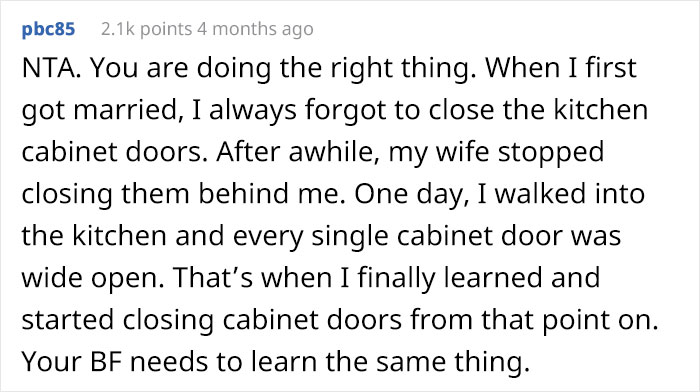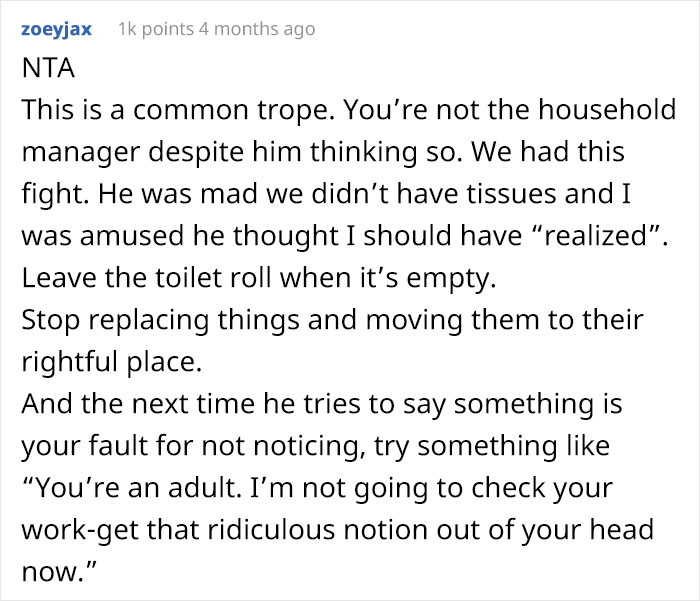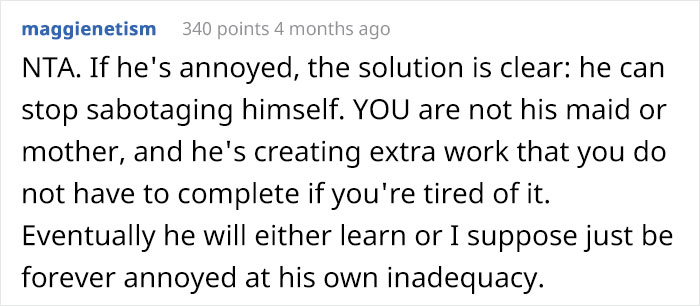
No two people are exactly alike. This means that living under the same roof with someone requires compromise. You know, working on your imperfections so you don’t make the person you want to be with miserable. Or even worse, scare them off.
But not everyone is willing to. Reddit user u/annabananakittycat used to clean up after her boyfriend and she had gotten sick and tired of it. Eventually, she confronted him but the guy wasn’t listening. In order to highlight her point, u/annabananakittycat stopped being the mom of the home and began caring just for herself.
At first, it looked like her plan worked. Her BF got annoyed by their new everyday life quite fast. But then, he still didn’t get the message — he didn’t change. This confused u/annabananakittycat. She was no longer sure whether the way she handled the situation was OK or not. So she made a post to describe her story and ask people for advice. Here it is.
Image credits: gratuit (not the actual image)
The situation, however, isn’t black and white. u/annabananakittycat has been together with her boyfriend for about seven years now. “We have a lot of fun together and make each other laugh often,” the Redditor told Bored Panda. “We just grew up differently and I’ve always been the organizer and his mom took care of everything. Also, he does have ADD (I saw some of the comments asked) but he is not being treated for it. He’s like that with pretty much everything. I don’t think he has an ill motive, but it’s still annoying.”
She added that her partner “is pretty bad at compromising and not being in control.” u/annabananakittycat considers it to be their biggest issue. “We’re both control freaks. I’m not free of the blame.”
Since added that her partner been working on it since their last bad fight over it. “Right now, I think we’re relatively stable. The chicken in the pantry thing nearly tipped me over the edge though. He’s lost my car keys numerous times and one time I had to get a vehicle towed to the dealership because he lost both keys. So now I refuse to let him touch the keys ever,” she explained, laughing.
Of course, every situation is different and we can’t really know what u/annabananakittycat’s boyfriend or their relationship is like just from reading this post but David Bedrick, J.D., Dipl. PW, said that in his experience as a therapist and attorney, individuals who are resistant to compromise do not need more pressure to compromise, but instead more support for their resistance.
For example, Bedrick suggests considering this situation: “You and I are planning to meet for a cup of coffee around noon. You say you’d rather meet at 11:30 am; I respond saying that 11:30 am is a bit early for me given my schedule and I’d prefer noon,” he wrote in Psychology Today. “If you and I have no strong feelings or reasons not to compromise, we may decide on 11:45 am. Win-win; no problem.”
But if you have always been willing to make reasonable compromises and the other person has regularly failed to carry out your agreed times to meet, then you have a good reason to not go along with the resolution, Bedrick pointed out.
“In addition, if I am regularly not following through on our agreements, I too may have good reasons to not go along with the compromised agreements. If a counselor were to support your resistance by saying, ‘I bet you have good reason to not agree to a compromise, please say more about this,’ you might describe our prior history.”
“If the counselor said to me, ‘It appears you are regularly unable to show up at the appointed time, I bet you have good reasons for that to be true,’ I might say, ‘I have been orienting my schedule every day for the last ten years around other people and what they want. I’m tired of it!’ Going further to resolve this conflict would mean helping me not agree so readily to meet at times that don’t really work for me and helping you be less agreeable to meeting times when you are not convinced I will show up on time. In short, a psychological solution is the exact opposite of the compromise solution – we need support for our resistance to compromise and encouragement to be less agreeable.”
To be sustainable, Bedrick argued, “resolutions to relationship conflicts need to support people’s resistance so that the individuals and their relationships can grow and both people can learn more about each other. In this way, relationship conflicts are not merely problems to resolve; like arrows, they point to the next step on the paths of relationships.” An interesting thought to end with, for sure.
Here’s what people think about the situation














